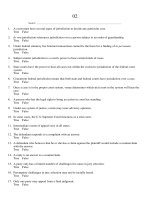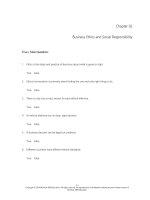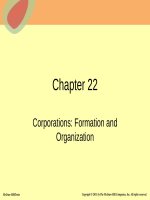- Trang chủ >>
- Thạc sĩ - Cao học >>
- Luật
Lecture Dynamic business law, the essentials (2/e) - Chapter 23: Securities regulation
Bạn đang xem bản rút gọn của tài liệu. Xem và tải ngay bản đầy đủ của tài liệu tại đây (222.49 KB, 13 trang )
Chapter 23
Securities Regulation
McGrawHill/Irwin
Copyright © 2013 by The McGrawHill Companies, Inc. All rights reserved.
Security
Definition: Investment in a common enterprise
with the reasonable expectation of profit gained
predominantly from others’ efforts
232
Securities and Exchange Commission
(SEC)
Created in 1934 to:
• Enforce securities laws
• Interpret provisions of securities acts
• Regulate the activities of securities brokers,
dealers, and advisers
• Regulate the trade of securities on securities
exchanges
233
Expansion of SEC Powers in the 1990s
• Securities Enforcement Remedies and Penny Stock
Reform Act of 1990
• Market Reform Act of 1990
• Securities Acts Amendments of 1990
• National Securities Markets Improvement Act of 1996
• Sarbanes-Oxley Act of 2002
234
The Securities Act of 1933: Terminology, Rules,
and Procedures
Registration Statement: Document containing
• Description of securities offered for sale
• Explanation of how proceeds from sale of securities will be used
• Description of registrant’s business and properties
• Information about management of company
• Description of pending lawsuits in which registrant involved
• Certified financial statements
235
The Securities Act of 1933:
Terminology, Rules, and Procedures
(Continued)
Prospectus: Written document similar to
registration statement, used as an advertising
tool to attract potential investors
236
The Securities Act of 1933:
Terminology, Rules, and Procedures
(Continued)
Periods of the registration statement and
prospectus filing process:
• Pre-Filing Period
• Waiting Period
• Post-Effective Period
237
The Securities Act of 1933: Terminology, Rules, and
Procedures (Continued)
• Exempt Transactions-Securities exempt from standard SEC registration
requirements
• Limited Offers: Involve small amounts of money, or are offered only to
sophisticated investors
-Private Placement Exemption: Exempts private offerings of securities
-Rule 505: States that private offerings may not exceed $5 million in a
twelve-month period, and firms do not have to believe that investors have
a reasonable ability to evaluate risk
-Rule 504: Exempts non-investment firms that offer no more that $1
million in securities in a twelve-month period
-Section 4(6): Exempts securities offered only to accredited investors for
amount less than $5 million
• Intrastate Issues: Exempt local investors in local businesses
• Re-sales of Securities: Exempt transactions by any person other than an
issuer, underwriter, or dealer
238
The Securities Act of 1933: Terminology,
Rules, and Procedures (Continued)
Restricted Securities: Securities acquired under Rule
505, 506, or Section 4(6) that must be registered for
resale, unless investor follows Rule 144 or 144(a)
Violations may result in:
• Administrative Action
• Injunctive Action
• Criminal Prosecution
239
The Securities Exchange Act of 1934:
Terminology, Rules, and Procedures
• Section 10(b): Prohibits use of “manipulative and
deceptive devices” to bypass SEC rules
• Insider Trading: Trading in which company employee or
executive uses material inside information to make profit
• Misappropriation Theory: Individual who wrongly
acquires and uses inside information for profit is liable for
insider trading
2310
The Securities Exchange Act of 1934:
Terminology, Rules, and Procedures
(Continued)
• Tipper/Tippee Theory: Individual who receives material inside
information as a result of insider’s breach of duty is guilty of
insider trading
• Statutory Insiders: Certain stockholders, executive officers,
and directors who must file reports detailing their ownership
and trading of the corporation’s securities
• Short-Swing Profits: Profits made from sale of company stock
within any 6-month period by statutory insider; per Section
16(b), these profits must be returned to company
2311
The Securities Exchange Act of 1934:
Terminology, Rules, and Procedures
(Continued)
• Proxy: Document that authorizes an individual to vote
shareholder’s share of stocks at a shareholder’s meeting
• Proxy Solicitation: Process of obtaining authority to vote on
behalf of shareholder
• Violations of Securities Exchange Act of 1934 may result in:
-Criminal penalties
-Civil penalties
-Suits against those involved in insider trading under Insider
Trading and Securities Fraud Enforcement Act of 1988
2312
State Securities Laws
“Blue Sky” Laws: Regulate the offering
and sale of purely intrastate securities
2313









